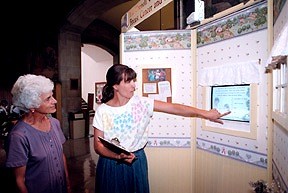Breast cancer risk program reaches out to rural women with interactive display from Cornell University
By H. Roger Segelken
Is there anything I can do to reduce my risk of breast cancer? Will changes in diet and lifestyle help? How can I help members of my family make healthful choices?
These are some of the frequently expressed concerns that are addressed by a computer-based interactive display from the Program on Breast Cancer and Environmental Risk Factors (BCERF) at Cornell University. The display makes its premiere appearance Aug. 11 at Empire Farm Days in Seneca Falls.
BCERF is a unique program, supported by federal and state funds, to help residents of New York state reduce their risk of getting breast cancer. Scientists in the program evaluate the many, sometimes confusing, pieces of scientific information about what may cause breast cancer and help people learn new ways to use that information to reduce their own risk.
To effectively reach residents of rural areas, BCERF has developed the special display for use at fairs and farm shows across the state. The display features a self-guided, touch-screen computer program that includes the images and voices of farm and rural women modeling risk reduction strategies. The display is presented within a "country kitchen" with cheerful wallpaper, a "window" with a farm view and another "window" with the computer screen in it. By touching the screen, viewers can access information on a variety of breast cancer topics that may be most relevant to them, including reducing exposure to pesticides and chemicals, diet and lifestyle factors, early detection and answers to some frequently asked questions.
"Until now, women in rural areas of New York state have had limited access to breast cancer risk reduction information," says BCERF director June Fessenden MacDonald. "We hope that by bringing this display to fairs and farm shows, that information will be more accessible and useful to people in those areas."
The project was developed following six months of research and study with rural women and professional partners, including Cornell Cooperative Extension; the New York Center for Agriculture, Medicine and Health (NYCAMH); the Cancer Information Service of the National Cancer Institute; and the New York State Department of Health.
BCERF is housed within the universitywide Institute of Comparative and Environmental Toxicology in the Cornell Center for the Environment. Funding for BCERF is provided by the New York State Department of Health and the U.S. Department of Agriculture/Cooperative State Research Education and Extension Service.
Following Empire Farm Days, the BCERF display will be featured at "Women's Day" of the New York State Fair on Sept. 1 in Syracuse.
Media Contact
Get Cornell news delivered right to your inbox.
Subscribe